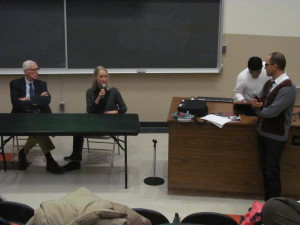
Dr. Herbert Thomas (far left) and Director Ruth Thomas-Suh (left) discussing the film before answering the audience’s question with Chris Rafinski (far right).
Images of recent school shootings were displayed on screen for “REJECT,” a documentary by Ruth Thomas-Suh. From Columbine to Newtown, violence in schools was one of the major topics presented in the film.
The event, sponsored by the Counseling Honors for Advocacy and Social Issues, at Queens College was one of many screenings that were shown throughout the country. It was co-sponsored by organizations on campus such as the Student Association, Student Life and New York Public Interest Research Group.
Thomas-Suh and her father, Dr. Herbert Thomas who was interviewed for the film, attended the documentary — Thomas-Suh’s first — examining what occurs when people are socially rejected. Offering viewpoints from social psychologists and teachers, the film highlighted behavioral problems such as aggression, physical pain and meaninglessness as a result of exclusion.
The film presented evidence from scientific research on social exclusion and stories of people who felt discriminated against for who they were. One unidentified woman of color in the film said she was once told she was “so nice she should be white.”
“‘REJECT’ takes a science-based and solution-oriented look at the roots of bullying behavior and violent behavior against the self or others,” according to Thomas-Suh’s statement.
“The film aims to raise public consciousness about the serious and potentially lethal consequences of interpersonal rejection in its many forms: peer bullying, parental neglect — or abuse — race discrimination and other forms of social rejection across all age groups.”
One story presented in the film was of Eric Mohat, a 17-year-old student who attended Mentor High School in Mentor, Ohio. Described as a “social butterfly” by a friend of his, he was bullied in school, particularly for wearing pink — his favorite color.
On the same day, a bully from his math class told him if he killed himself, “no one would miss him.”
On March 27, 2007, Mohat went home and committed suicide.
After the documentary was screened, Thomas-Suh and Thomas took part in a question-and-answer session with the audience. Before starting, Thomas-Suh spoke a bit on the film and acknowledged the difficulty of editing footage with school shootings as it was a “grey area” they “really [wanted] to talk about.”
“Our brains are wired to connect. That’s why we feel physical pain [when we experience social exclusion],” Thomas-Suh said while discussing a need for community.
Dr. Thomas responded to a question from an audience member on how to be more accepting. He highlighted two issues people should be aware of when welcoming others: changing people and objectifying the situation.
“Each one of us can change another person,” Dr. Thomas said. “Everyone in this room is equally responsible to help others.”
Furthermore, Dr. Thomas remarked people had to “learn to objectify the situation.” He said through understanding, we would comprehend why people commit certain actions.
President of CHASI, Chris Rafinski, was the “primary catalyst” for the screening at QC, after he saw snippets of the documentary at Mount Sinai Hospital on Sept. 24, 2013 where Thomas-Suh was in attendance. He said the first screening was deeply moving, so much so it brought him to tears.
Rafinski elaborated on what the poster for the film — which features an arrow from the word “accept” pointing to the word “reject”—meant when students passed by it.
“The poster brings up the conflict, a discussion, but it also brings up solutions,” Rafinski said.
Dr. Thomas spoke on the significance of acceptance to correct situations where rejection is frequent. In the film, he spoke on what could occur if acceptance became the norm in society.
“I believe acts of kindness, acts of love can lead to a society to where we truly can find peace,” Dr. Thomas said.














